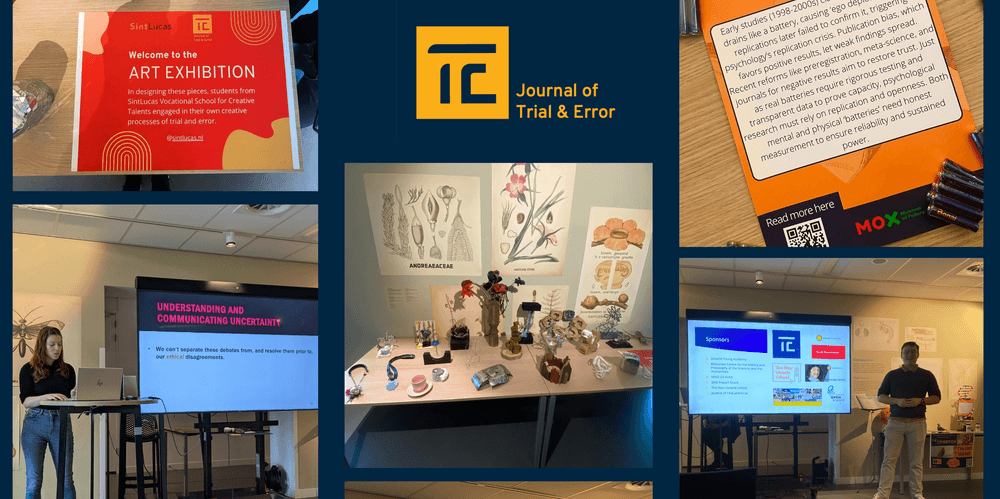~ 9 min read
Founding JOTE: A Conversation with Max Bautista Perpinyà. “I Don’t Think Forbes Has Any Legitimacy in Acknowledging Scientific Success.”
In April this year, JOTE co-founders Stefan Gaillard and Martijn van der Meer appeared on national television to talk about their nomination for the Forbes 30 under 30 listing. “It’s a little bit awkward”, said Van der Meer shortly after the introduction of the Journal. Not only could one of the founders (Max Bautista Perpinyà) not be listed because of his age, but also because JOTE generally tends to be critical of success-focused rankings like these, he said.
The talk show performance hints at the fact that the three founders of JOTE had different ideas and motivations for establishing the journal. In this three-part series, we interview the three founders about these differences, and the history of the Journal, starting with the co-founder that didn’t enter (nor endorse) the Forbes listing: Max Bautista Perpinyà.
Max was part of the initial team that created JOTE in 2018. He fulfilled several roles in the journal – such as sketching its basic principles and aims, developing editorial policies, outreach, establishing institutional contacts, and coordinating design– until 2022. He is currently pursuing his PhD at UCLouvain on the history and philosophy of scientific environmentalism in the Spanish political transition from Francoism towards democracy.
How did you get involved with JOTE?
"I had a role in JOTE from its start, when it was still a joke, then through its period when it served as a sort of ‘cultural intervention’. I left shortly after the publication of the first issue and the serious beginning, when the processes of professionalisation and institutionalisation were gaining traction.
"A key moment that can be seen as JOTE’s start was an Open Science talk where Alex Visser, Martijn van der Meer, Stefan Gaillard and I attended independently. We met there by chance and started talking about how this movement for transparency in science related to what we were reading in our masters’ in the History and Philosophy of Science, like Latour’s black box or Collin’s writings about the difficulty of replicating experiments. We wanted to use these kinds of concepts – to open up science, think critically about what it means to replicate – and articulate them through some kind of technology. JOTE was our technology, our way to materialise our intellectual interests. As an ethos, we all had the ambition to use our critical stance on science to contribute to the academic community in general and to the natural sciences specifically. It’s a bit of a naïve idea, I think, but at that time, at least for me, it was useful to transition from my background in the life sciences to the humanities.
What was your role in establishing JOTE?
"I mostly worked on thinking about how to communicate our project to scientists. I thought of myself as a ‘translator’. I talked a lot about JOTE to former colleagues, many of whom were doing their PhD in Neuroscience in different parts of Europe. I also reached out to the coordinators of my former Neuroscience master’s program and gave talks in several places to spread the message, and very importantly, to receive feedback. It was really important for us to know what the scientific community needed, so talks like the one Martijn and I gave at the Annual Graduate Student Symposium at the University of Cambridge Laboratory of Molecular Biology were key for that, as well as getting recognition and putting the JOTE brand out there.
What were your personal motivations, ideas and ideals when establishing the Journal?
"My time in JOTE allowed me to bridge the gap between my background in the natural sciences and my ambition to research and work in the humanities. At that point, I had accumulated some unsatisfactory experiences in the lab (although I do have many fond memories though!), and I was frustrated by the lack of transparency in the research papers. At the coffee machine in the lab, scientists are very upfront and honest about their daily difficulties, their struggles, and their lack of trust in what they are doing. But in the research papers I was reading while I was a Neuroscience graduate, I would find, instead, big promises about the possibility of addressing complex issues such as depression or schizophrenia, through understanding molecular processes, for instance. This gap –the gap between the coffee machine talk and the big breakthrough promises of science– was troubling for me. It generated unrealistic goals for young scholars, and my motivation came from a need to reduce expectations, embrace the daily life of research, and the mediocrity of academia, to collectively humble ourselves with what we are doing. In a time when researchers are demanded to think about their social impact, I think it’s important to think more about what we are actually doing, and not what we could do if all went well.
Does JOTE differ from your first conception of the project, and if so, how?
"It does. JOTE has become successful in securing funding and professionalising the structure. These are objectives that we set early on and I congratulate those who made that possible. However, in my view, there have been changes in how some of the core principles of the organisation are implemented. Two of JOTE’s so-called co-founders appear now in the Forbes list ’30 under 30’, which in my view, sits squarely against two core ideals of JOTE. First, the initial goal of JOTE on questioning success in academia; and second, the idea that science is a social act best understood by the collective work of many, and not by the success of individuals with great ideas.
"Regarding the first, I don’t think Forbes has any legitimacy in acknowledging scientific success. Forbes – known for publishing an annual list of the wealthiest individuals – is not a referent for any academics who believe in social justice and the role of science in contributing to it. Who makes the list? What background do the decision-makers have? What are the selection parameters? This lack of transparency is expected from a for-profit company that celebrates individual achievement in the capitalist ladder. It is not, and should not, in my opinion, be the same measuring stick for a student-led, non-profit academic journal that aims to change “how science is done.”
"Forbes may see JOTE’s interest in ‘failures’ as simply, and yet again, a way to succeed. In this way, failure is just a stepping stone towards success, but success remains the objective. I am not surprised to see Forbes employing this discourse, but it is not something I would be comfortable with sharing if I were still involved in JOTE. It is also important to remember that the Forbes list has been tainted in recent years by several entrepreneurs ending up in jail for financial and crypto scams. Forbes has now expanded into several categories beyond entrepreneurship, like ‘Sports’, ‘Social Impact', and 'Science & Healthcare’ (the category where JOTE’s ‘co-founders’ were selected for). For me, this is an intrusion into other professional sectors and an attempt to whitewash Forbes’ failures and illustrates the meaninglessness of their rankings. I am disappointed that JOTE is now being used to elevate Forbes’s reputation.
"A second point in which I see JOTE departing from its original stance is seeing science as an exercise of entrepreneurship rather than a complex social phenomenon. JOTE was built by many, not only its official three white cis-male ‘co-founders’. Alex Visser was also at the initial OS meeting, and equally important are their contributions as well as those of other non-cofounders. I am also the first one responsible for using the category of ‘co-founder’, building on the idea that the most important aspect of a successful enterprise is having ‘the great idea’. As historians of science, we could do better than that. Typesetting, designing, administration, outreach, communication, and a big etcetera – those were vital tasks that we all participated in, so I am just not as comfortable with the notion of ‘co-founder’ as I used to be. Perhaps it’s not only that JOTE has changed since the initial conception, but that I have also changed and my values may also lay elsewhere.
What was the most productive or most notable failure in the establishment of JOTE, and what did you learn from it?
"I honestly cannot think of specific ‘failures’, but I can say that the most notable and productive achievement came from a precarious situation. We started the project as students, and many of us also worked part-time, so running the project without funding was not sustainable in the long run. I think the most radical achievement of JOTE is not that it publishes null results or failed experiments, it is its financial and legal structure. As a non-profit, it mostly sustains itself through grants, and donations from research institutes (like the Descartes Centre at Utrecht University), and services provided to university libraries. Setting up these structures took time, effort, and expertise; and importantly, allowed for (some) of the members of JOTE to be paid. I was not there when all this work was done, and since I left, I think this is the most important thing JOTE can teach other organisations. I was proud that they managed to create a sustainable alternative to academic publishing. In the face of the parasitic monopoly of big publishers, this is no easy feat. JOTE shows us that as academics we don’t need to rely on commercial publishers like Springer, Elsevier or Wiley. We have the resources and motivations in-house. The makers of JOTE were completely inexperienced, yet they made it possible.
What do you hope for the future of JOTE?
"I only hope that newer people keep joining the organisation and keep the journal and the centre a radical sustainable alternative to publishing research. Both the content and institutional form of JOTE need to be radical, bottom-up, and committed to social justice. For that, I think JOTE needs to be young to be daring. In the few years since its inception, it has been the venue for great articles and special issues, like the one on the Consequences of the Scientific Reform Movement. We need more issues like this, that allow for critical self-reflexivity for those of us who want to reform (or revolutionise?) the scientific sphere.

Marcel Hobma is a student in History and Philosophy of Science, and trained as an (investigative) journalist. His interests vary from the Philosophy of Biology to the incentive structure of science. He currently works on his Master's thesis on the cultural evolution of values in nutrition science.




